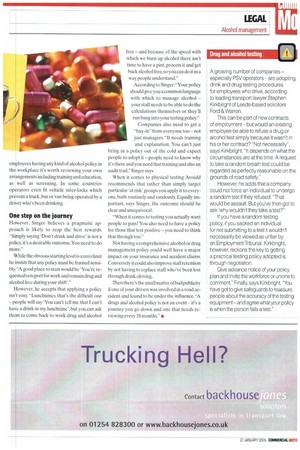Drug and alcohol testing A growing number of companies especially
Page 35

If you've noticed an error in this article please click here to report it so we can fix it.
PSV operators-are adopting drink and drug testing procedures for employees who drive, according to leading transport lawyer Stephen Kirkbright of Leeds-based solicitors Ford & Warren.
This can be part of new contracts of employment but would an existing employee be able to refuse a drug or alcohol test simply because it wasn't in his or her contract? Not necessarily", says Kirkbright. "It depends on what the circumstances are at the time. A request to take a random breath test could be regarded as perfectly reasonable on the grounds of road safety."
However, he adds that a company could not force an individual to undergo a random test if they refused. "That would be assault. But you've then got to ask 'why wouldn't they take a test?"
If you have a random testing policy, if you sacked an individual for not submitting to a test it wouldn't necessarily be viewed as unfair by an Employment Tribunal. Kirkbright, however, reckons the key to getting a practical testing policy adopted is through negotiation.
Give advance notice of your policy plan and invite the workforce or unions to comment." Finally, says Kirkbright, "You have got to give safeguards to reassure people about the accuracy of the testing equipment and agree what your policy is when the person fails a test."


































































































































































































